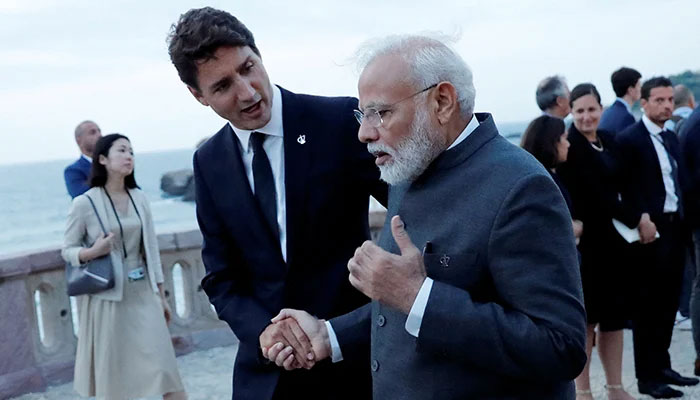Rise in tensions
Trudeau administration has communicated its findings with India and expelled Indian envoy
Canada and India are once again in the fighting ring. Tensions that erupted between the two countries after the killing of a Sikh separatist leader, Hardeep Singh Nijjar, in June 2023 had waned within a couple of months – or so we thought. Now, the Canadian government has presented India with evidence that shows a link between the agents of the Indian government and the murder of Nijjar. Back in June, when Canadian PM Justin Trudeau spoke strongly against India’s misadventures on Indian soil, his government was asked to present evidence for its accusations. Now the Trudeau administration has communicated its findings with India and expelled the Indian envoy from its country – although India maintains that it withdrew its envoy. In a tit-for-tat move, India has also expelled Canadian diplomats from its country. On Wednesday (Oct 16), Trudeau said that India made “a horrific mistake” by thinking it could interfere as aggressively as it did in Canada’s sovereignty. Previously, world leaders played a big role in preventing the two countries from further straining their ties primarily due to their trade ties with India and the fact that they could use it as a buffer against China’s rise on the global stage. But now that Canada’s sovereignty is at stake, let’s see how this episode unfolds.
That India has taken a rather aggressive approach against dissidents is not new. In 2019, it abruptly snatched the rights of people in Occupied Kashmir, cut off their communication channels, and placed several pro-India Kashmiri leaders under house arrest. Instead of targeting dissidents abroad, the Indian state must instead focus on dialogue. India’s history with its Sikh population is not ideal. The fact that the state is not even trying to build bridges between minority communities and is more focused on adopting an authoritarian approach points to its complicity in widespread chaos among Indian communities.
This latest spat with Canada is an opportunity for India to rectify its mistakes and give dialogue and diplomacy a chance. Instead of using force or bloodshed, it should engage with leaders and try to carve out a middle ground. It should also work on fixing its ties with its neighbours and work towards economic cooperation. While India has successfully managed to show itself as a rising economy, problems are still there. This rise is riding on the back of its tech sector, and many people employed in other sectors are facing the brunt of income inequalities. This has also led to mass emigration to other countries, particularly Canada. According to official data, the number of Indians immigrants rose from 32,828 to 139,715 from 2013 to 2023, which is a 326 per cent increase in a 10-year span. Diplomatic tensions between countries hurt the population that has no say in its government’s doing. It is time India put the welfare of its people over its short-term authoritarian goals.
-
 Jesy Nelson Reflects On Leaving Girls' Band Little Mix
Jesy Nelson Reflects On Leaving Girls' Band Little Mix -
 World’s First Pokemon Theme Park Opens In Tokyo, Boosts Japan Tourism
World’s First Pokemon Theme Park Opens In Tokyo, Boosts Japan Tourism -
 Waymo Trains Robotaxis In Virtual Cities Using DeepMind’s Genie 3
Waymo Trains Robotaxis In Virtual Cities Using DeepMind’s Genie 3 -
 5 Simple Rules To Follow For Smooth, Healthy Hair
5 Simple Rules To Follow For Smooth, Healthy Hair -
 $44 Billion Bitcoin Blunder: Bithumb Exchange Apologizes For Accidental Payout
$44 Billion Bitcoin Blunder: Bithumb Exchange Apologizes For Accidental Payout -
 Katie Price Ends Public Feud With Ex Peter Andre After 16 Years
Katie Price Ends Public Feud With Ex Peter Andre After 16 Years -
 Apple May Bring ChatGPT And Other AI Apps To CarPlay
Apple May Bring ChatGPT And Other AI Apps To CarPlay -
 Meghan Markle, Prince Harry Likely To Attend Super Bowl Halftime Show 2026
Meghan Markle, Prince Harry Likely To Attend Super Bowl Halftime Show 2026 -
 AI Next Big Trial: Elon Musk Calls For ‘Galileo Test’ To Prove True Intelligence
AI Next Big Trial: Elon Musk Calls For ‘Galileo Test’ To Prove True Intelligence -
 US Appeals Court Affirms Trump’s Immigration Detention Policy
US Appeals Court Affirms Trump’s Immigration Detention Policy -
 Bella Hadid, Adan Banuelos Rekindle Romance After Brief Separation
Bella Hadid, Adan Banuelos Rekindle Romance After Brief Separation -
 Jay-Z Shares Bold Advice With Bad Bunny For NFL Super Bowl Halftime Show Appearance
Jay-Z Shares Bold Advice With Bad Bunny For NFL Super Bowl Halftime Show Appearance -
 Epstein Probe: Bill, Hillary Clinton Call For Public Testimony Hearing
Epstein Probe: Bill, Hillary Clinton Call For Public Testimony Hearing -
 Brooklyn Beckham Considers Adoption As Nicola Peltz Can't Carry A Baby
Brooklyn Beckham Considers Adoption As Nicola Peltz Can't Carry A Baby -
 Expert Discusses 'complications' Of Measles Outbreak
Expert Discusses 'complications' Of Measles Outbreak -
 Kaley Cuoco Recalls Her Divorce With Karl Cook: 'I Was Gonna Die'
Kaley Cuoco Recalls Her Divorce With Karl Cook: 'I Was Gonna Die'




